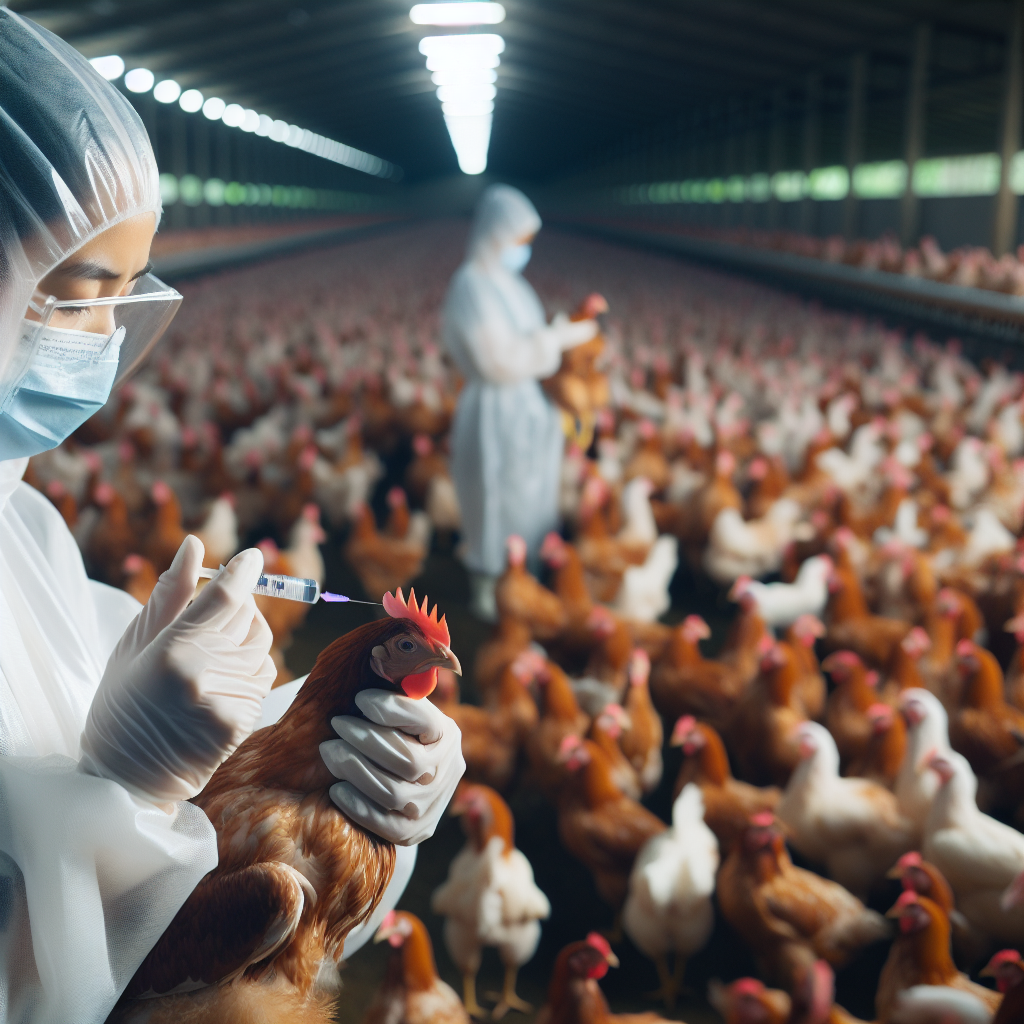Are you interested in partnering with local poultry communities to navigate and influence regional regulations? This article will outline effective strategies for collaborating with these communities and utilizing their expertise to shape regulatory policies. By building strong relationships and leveraging their insights, you can create a mutually beneficial partnership that ensures the well-being of poultry farmers while promoting sustainable practices and responsible regulations. Discover how you can make a positive impact on the poultry industry and strengthen your influence in regional policy-making.
Understanding regional regulations
To effectively collaborate with local poultry communities, it is essential to have a comprehensive understanding of the regional regulations that govern the poultry industry. Conduct thorough research on the specific regulations and requirements in your region, including permits, licenses, and zoning restrictions. Familiarize yourself with the regulatory bodies responsible for enforcing these regulations and identify the key players who shape poultry policies in your area.
Attending local regulatory meetings and conferences can provide valuable insights into the current and upcoming changes in regulations. Stay updated on any proposed changes and actively participate in the discussions. By being well-informed about the regulatory landscape, you can better navigate and influence the decision-making processes that impact the poultry community.
Building relationships with local poultry communities
Building strong relationships with local poultry communities is crucial in collaborating effectively and achieving common goals. Join local poultry organizations and associations to become part of the community and gain firsthand knowledge of their challenges and needs. These organizations often organize events, fairs, and workshops that provide opportunities to engage with local farmers and industry professionals.
Volunteering your time and expertise in community projects or initiatives related to poultry farming can help establish trust and credibility within the local poultry community. By actively engaging with local poultry farmers, you can gain valuable insights into their experiences and build strong networks.
Establishing communication channels with local farmers is vital for effective collaboration. Regularly connect with them through platforms such as social media, email newsletters, or by organizing regular meetings. This open line of communication will foster trust, facilitate knowledge sharing, and enable the exchange of ideas.
Sharing knowledge and information
Sharing knowledge and information is essential for empowering local poultry communities and supporting their growth and development. Organize educational workshops and seminars on topics such as poultry management, biosecurity, and best practices compliant with regional regulations. These workshops can serve as platforms for knowledge exchange, enabling industry professionals to learn from each other and stay updated on the latest advancements.
Conduct information sharing sessions where local poultry farmers can discuss their challenges and seek advice from experts in the field. These sessions can prove valuable in addressing specific concerns and finding innovative solutions collectively.
Create a platform, either online or offline, where local poultry communities can exchange ideas, share experiences, and collaborate on common issues. This platform can include discussion forums, online groups, or even physical gatherings where the community can come together to address challenges and work towards mutual goals.
Providing resources and guidelines on regional regulations is another valuable way to support local poultry communities. Compile information on permits, licensing procedures, and compliance requirements, and make them easily accessible to farmers. This will empower them to navigate the regulatory landscape more effectively and ensure compliance with the regulations.
Collaborating on policy advocacy
Collaboration with local poultry associations and organizations can amplify the collective voice of the poultry community and influence regional policies. Form partnerships and collaborations with these organizations to jointly advocate for favorable policies and address common concerns. By joining forces, you can leverage the combined knowledge, resources, and influence to affect positive change.
Participate in public consultations and stakeholder meetings hosted by regulatory bodies and government authorities. These forums provide an opportunity to express concerns, provide feedback, and propose alternative solutions. Actively engage in these processes by presenting evidence-based arguments and sharing insights from the local poultry community.
Creating advocacy campaigns is an effective way to raise awareness and mobilize support for poultry-related issues. Use different communication channels, such as social media, local newspapers, and community meetings, to highlight the importance of the poultry industry and the need for favorable policies. Encourage local farmers and community members to actively participate in these campaigns to demonstrate the collective strength of the poultry community.
Engaging with government authorities
Establishing direct contact with local government officials is crucial for effective collaboration and influencing regional regulations. Reach out to relevant officials and schedule meetings to discuss concerns, suggestions, and proposals for policy improvements. Provide them with information and data that supports your arguments and helps them understand the impact of certain regulations on the local poultry industry.
Participate in policy development processes by actively engaging with government authorities. Offer expertise, suggestions, and constructive feedback during the policy drafting stages to ensure that the concerns and needs of the local poultry community are adequately represented.
Regularly provide feedback on proposed regulations, highlighting any potential challenges or opportunities for improvement. By actively engaging and sharing your insights, you can influence policymakers and help shape regulations that are fair and supportive of the local poultry industry.
Promoting sustainable poultry practices
Promoting sustainable poultry practices is crucial for the long-term success and viability of the poultry industry. Encourage local poultry communities to adopt environmentally friendly practices that minimize the industry’s ecological footprint. This can include promoting the use of renewable energy sources, implementing waste management strategies, and reducing water consumption.
Support research initiatives focused on sustainable poultry farming methods and technologies. By funding or participating in research projects, you can help develop innovative solutions that improve the sustainability and efficiency of poultry operations. Share the findings of these research projects with local poultry communities to encourage the adoption of sustainable practices.
Advocate for animal welfare in local regulations by promoting humane handling and care practices. Collaborate with animal welfare organizations and regulatory bodies to raise awareness about the importance of animal welfare and implement regulations that prioritize the well-being of poultry.
Promote responsible use of resources within the poultry community by encouraging efficient use of water, energy, and feed. Provide educational resources and training on resource management practices that can help reduce costs for farmers while minimizing the environmental impact.
Sharing success stories
Sharing success stories is an effective way to inspire and motivate local poultry communities. Highlight positive outcomes of collaboration and showcase case studies of successful navigation of regulations. Share stories of individuals or farms that have overcome challenges, implemented innovative practices, or achieved significant milestones. This will not only celebrate their achievements but also inspire others and demonstrate what is possible with collaboration and a proactive approach.
Publish articles and success stories on local platforms such as community newsletters, regional newspapers, or industry magazines. Use these platforms to spread the word about the positive impact of collaborative efforts and encourage others to join in.
Utilize social media platforms to amplify success stories and reach a broader audience. Share stories, photos, and videos that showcase the accomplishments of local poultry communities. Encourage community members to share their own success stories and engage in conversations about the importance of collaboration and effective regulation navigation.
Seeking legal and policy expertise
Navigating complex legal frameworks can be challenging, and seeking legal and policy expertise is crucial for effectively collaborating with local poultry communities. Consult legal experts who specialize in regional poultry regulations to ensure compliance and stay updated on any legal developments that may impact the industry. These experts can provide guidance on permits, licenses, and other legal requirements that poultry businesses must adhere to.
Engage policy advisors or consultants who have experience in advocating for changes in regulations. These professionals can provide strategic advice on influencing regional policies and help identify opportunities for collaboration with government authorities.
Form partnerships with organizations working on legal advocacy for the poultry industry. By aligning with these organizations, you can collectively pool resources and expertise to facilitate legal changes that benefit the local poultry community.
Utilizing technology for collaboration
Technology can play a pivotal role in facilitating collaboration and knowledge exchange among local poultry communities. Create online platforms or forums dedicated to poultry farming, where industry professionals can connect, share insights, and discuss current challenges. These platforms can serve as virtual meeting spaces for networking, collaborations, and knowledge sharing.
Use social media platforms to connect with local poultry communities and raise awareness about opportunities for collaboration. Create dedicated social media accounts where updates, information, and success stories can be shared. Engage with community members through comments, messages, and live chats to foster a sense of belonging and encourage active participation.
Develop mobile applications that provide easy access to information, resources, and guidelines related to regional regulations. These apps can serve as a one-stop-shop for poultry farmers, enabling them to stay updated, seek assistance, and connect with other members of the community.
Establish offline networks and community groups where local poultry farmers can gather to discuss challenges, share experiences, and collaborate on initiatives. Creating physical spaces for collaboration and knowledge exchange can foster stronger relationships and enhance the sense of community among poultry industry professionals.
Supporting local poultry initiatives
Supporting local poultry initiatives is crucial for the growth and success of the industry. Invest in local poultry startups and entrepreneurs who are working on innovative solutions and technologies. Provide mentorship and resources to new businesses to help them navigate the challenges of starting and operating a poultry enterprise.
Collaborate on research and innovation projects with local universities, research institutions, and industry professionals. By combining resources and expertise, you can foster innovation in the poultry industry and develop solutions to shared challenges.
Support community-led initiatives that aim to improve poultry farming practices. This can include projects focused on training and capacity building, improving access to resources, or enhancing the overall sustainability of local poultry operations. By providing financial support, resources, or technical assistance, you can empower the community to drive positive change from within.




